Re-elected for an eighth consecutive term last Sunday with almost 70 percent of the vote, Gildo Insfrán, the 72-year-old Peronist governor of Formosa since 1995, justified his permanence in power by saying: "Alternation is the decision of the people in elections."
The victory, which extends Insfrán’s 28-year grip on power in the northeastern province, was greeted with criticism from critics.
Senator Luis Naidenoff (Unión Cívica Radical-Formosa) denounced that the governor has managed to “consolidate an authoritarian leadership via submission and dependence on the state,” while the main opposition leaders in the province accused him of being an autocrat.
Possessing a record which no provincial leader in Argentine history or worldwide can dispute, only a handful of current heads of state worldwide had longer terms.
Following Insfrán’s second re-election as governor in 2003, a vote in which he received over 60 percent of the votes, with the support of Néstor Kirchner, he found himself with sufficient political capital to embark on a reform of the provincial Constitution, permitting him indefinite re-election.
Further re-elections followed in 2007, 2011, 2015 and 2019.
Roots
Insfrán was born on January 19, 1951, in Laguna Blanca, as the youngest son of a family of Paraguayan immigrants. His father, a veteran of the 1932-1935 Chaco War between Paraguay and Bolivia, died when Gildo was young, obliging his brother Miguel to take charge of the family.
The brother stepped up. Miguel managed to pay for Gildo’s university studies in Corrientes, where he graduated as a veterinary surgeon. And it was precisely in those university years when the governor’s political involvement began, flirting with the Maoist Partido Comunista Revolucionario (PRC) before eventually joining the Justicialist (Peronist) Party.
As from 1983, after the departure of the military dictatorship, Insfrán represented his native town as a provincial deputy and in 1987, he was elected lieutenant-governor on the ticket of Vicente Bienvenido Joga (1987-1995). The 28 years since 1995 have seen him at the helm of Formosa.
People in the region call him "Insfrán" and "Gildo" but in his inner circles he is nicknamed "El Uno" or "El Gober." To Peronist sectors he is the Uncle, "El Tío Gildo."
Insfrán personally styles himself the "first captain" but his achievements in governance are questionable.
According to INDEC statistics bureau, Formosa is one of the poorest provinces in the country, with 42.2 percent below the poverty line. It also has Argentina’s highest illiteracy rate at 4.1 percent, with peaks of 13.5 percent in some departments.
Reports indicate that 41.1 percent of the Formosa population have no drinking water in their homes. According to the National Health Ministry, infant mortality in the province is 12.6 percent, only below Corrientes, which reaches 14.5 percent.
Welcoming last Sunday’s re-election, President Alberto Fernández delighted in the Peronist leader’s “deserved triumph,” praising Insfrán’s “unwavering commitment to guaranteeing the wellbeing of the people of Formosa.”
Covid-19
As criticism from the opposition has increased, Insfrán’s rhetoric has grown fiercer, most notably against the nation’s centre of power, the City of Buenos Aires. He has sought to paint himself as a man in touch with his people, unlike those in Congress.
"The porteños, who do not know how to plant a lettuce, want to come and tell us what we have to do,” he said recently, slamming them as “drones who live off the effort and labour of all the Argentine people.”
The veteran Formosa governor’s angry streak has manifested itself in more authoritarian ways. During the first stages of the Covid-19 pandemic, he was denounced for institutional violence against those trying to dodge the compulsory lockdown decreed nationwide.
A statement by social and Catholic organisations in western Formosa, dated February 12, 2021, denounced persecution and repression of the province’s indigenous people, listing various cases in the context of the pandemic.
According to a Human Rights Watch (HRW) report on “Formosa’s abusive measures in response to Covid-19,” during the pandemic local police actively raided neighbourhoods where people had tested positive for coronavirus and dragged away those suspected of contagion.
Residents were taken away without knowledge of their destination, sometimes not allowed to pack clothing or items of personal hygiene.
From March, 2020 to April, 2021, a total of 24,000 persons were forced into confinement under "unhealthy conditions" in quarantine centres in Formosa, some of them for periods longer than the fortnight recommended by the World Health Organisation (WHO), according to Human Rights Watch.
The authorities also mixed in the same rooms people arriving at different times without taking into account their age, gender, state of health and other risk factors, said the report.
Other international organisations like Johns Hopkins University, Amnesty International, the Inter-American Court of Human Rights and the Supreme Court said that the Insfrán government violated human rights during the lockdown.
Residents
One of the most resonant cases was Zunilda Gómez, 33, who was snatched by the police from her Clorinda home when pregnant and locked up with her three children in a hotel room.
On January 5, Gómez started to haemorrhage and in desperation asked her daughter to climb out of the window to seek help. She later suffered a miscarriage.
Her husband, who was transferred to a quarantine centre 120 kilometres away after testing positive, found out about the loss of the pregnancy when a relative telephoned him, the NGO’s report states.
Sent by President Fernández, Human Rights Secretary Horacio Pietragalla Corti assured that apart from the odd problem, there were no systematic violations of human rights in Formosa within the framework of Insfrán’s actions to contain the contagion.
An Amnesty International report also denounced possible human rights violations in cases of people affected by the restricted access to Formosa Province, arrests at quarantine centres, the abusive use of force by security personnel and the repression of demonstrators.
An article published by Perfil and the Times in 2021 reported that the governor banned thousands of Formosa citizens outside the province from entry with over 7,500 stranded at the frontier, some of them for over seven months, without the Formosa authorities permitting them to return home.
In desperation at not being able to reunite with his family, Mauro Ledesma, 23, drowned in early October 2020, when trying to swim across the Bermejo River, which separates Formosa and Chaco provinces.
Reaction
The Supreme Court finally intervened on November 19, 2020, ordering the Insfrán government to guarantee the entry of those requesting it, reports the article written by Fundación Connectas, Red Ruido and the International Centre of Journalists.
In continuation, the Insfrán government was sued for its handling of cases suspected of Covid-19 in the province and for its overcrowded isolation centres with people who could not leave for weeks (home isolation was not permitted), even when testing negative.
"I don’t care about losing an election if I have to save the life of somebody from Formosa," said the once-Maoist devotee during the pandemic.
Brushing away allegations his region is a "feudal province" last Sunday night after securing his eighth term in office, Insfrán responded in a typically fiery way: "The Federal Capital [of Buenos Aires] is a fiefdom where the tenants are the vassals."
– TIMES/PERFIL








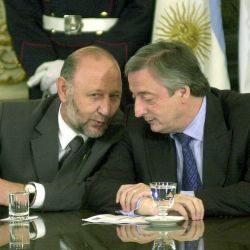
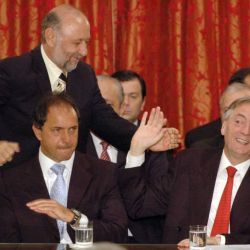
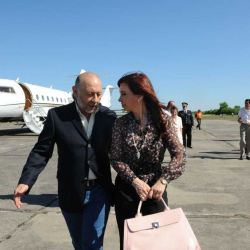
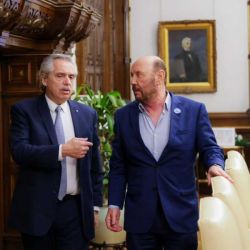
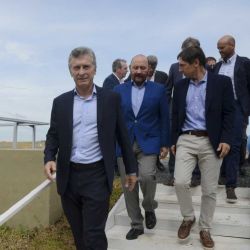












Comments